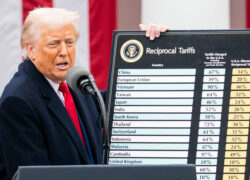
- Bahamian Businesses Affected
By Julian Reid
Bahama Journal News Editor
Some Bahamian businesses exporting goods may be forced to develop new marketing plans and strategies to be profitable now that U.S. President Donald Trump has announced a 10 percent reciprocal tariff which is applicable on all imports to the United States which will come into effect on April 5th.
Some of the major products exported to the USA from The Bahamas range from mineral fuels and oils to ships and boats and seafood.
Statistics show that in 2023, The Bahamas exported approximately $562 million worth of goods to the United States. That figure represents 80 percent of total exports so that added cost through the tariff means added costs and could lead to less profits.
A breakdown of exports includes the following:
• Mineral fuels and oils: Approximately $172 million (24 percent of total exports).
• Printed materials: Around $137 million (19.6 percent).
• Ships and boats: About $126 million (18.1 percent).
• Fish and crustaceans: Approximately $67 million (9.63 percent).
• Plastics and articles thereof: Around $46 million (6.66 percent).
The Caribbean spiny lobster is a significant export for Bahamian fishers and seafood suppliers. The Bahamas is the second-largest supplier to the U.S., accounting for 13 percent of its imports in this category.
Industrial companies like those located on Grand Bahama like Polymers International and BORCO could face challenges which could be exacerbated if the U.S. Trade Representative decides to impose its proposed one-million-dollar port fee.
The Government of The Bahamas released a statement in response to Mr. Trump’s announcement highlighting that under the Caribbean Basin Initiative, The Bahamas is part of a group of countries that export goods duty-free to the United States. It also said that The Bahamas currently maintains a trade deficit with the United States.
The government statement said: “we will engage with our U.S. counterparts and work collectively with our CARICOM partners in response to this development. The Government has approved a National Trade Policy aimed at diversifying trade. As part of our broader strategy to protect the Bahamian economy, we have already announced a number of measures, including the development of a trade diversification framework. We remain focused on minimizing the impact of global trade decisions on Bahamian businesses and consumers.”
The U.S. Stock market plunged in reaction to the announcement, affecting share prices of companies including Amazon, Apple and Nike. The S&P 500 fell almost 5 percent on Thursday, its worst drop since June, 2020, as allies and adversaries alike criticized President Trump’s actions and weighed their responses. The impact was similar on stock exchanges around the world. The UK’s FTSE 100 share index was down 1 percent while France’s CAC 40 fell 1.7 percent.
World leaders initially lamented the news but are now taking measures in response. Ursula Von Der Leyen, the European Commissioner says they are looking at countermeasures. Canada’s Prime Minister Mark Carney is taking retaliatory action and announced 25 percent tariffs on certain U.S. vehicles. The UK is reportedly looking at a 400-page list of U.S. products it could hit with tariffs.
Russia, however, is not on the list of countries to be hit with tariffs. The White House has reported that heavy sanctions already in place due to the combat with Ukraine “precluded any meaningful trade.” Cuba, Belarus and North Korea were also not on the list.


